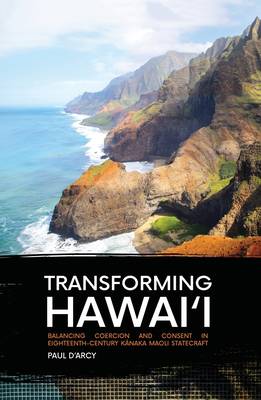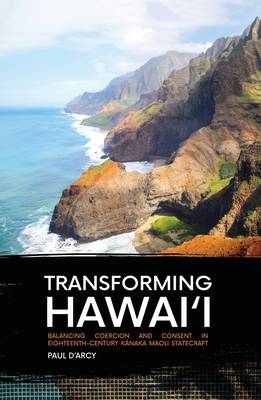
- Afhalen na 1 uur in een winkel met voorraad
- Gratis thuislevering in België vanaf € 30
- Ruim aanbod met 7 miljoen producten
- Afhalen na 1 uur in een winkel met voorraad
- Gratis thuislevering in België vanaf € 30
- Ruim aanbod met 7 miljoen producten
Zoeken
Transforming Hawai'i
Balancing Coercion and Consent in Eighteenth-Century Kānaka Maoli Statecraft
Paul D'Arcy
€ 60,45
+ 120 punten
Omschrijving
This study examines the role of coercion in the unification of the Hawaiian Islands by Kamehameha I between 1782 and 1812 at a time of increasing European contact. Three interrelated themes in Hawaiian political evolution are examined: the balance between coercion and consent; the balance between general structural trends and specific individual styles of leadership and historical events; and the balance between indigenous and European factors. The resulting synthesis is a radical reinterpretation of Hawaiian warfare that treats it as an evolving process heavily imbued with cultural meaning. Hawaiian history is also shown to be characterised by fluid changing circumstances, including crucial turning points when options were adopted that took elements of Hawaiian society on paths of development that proved decisive for political unification. These watershed moments were neither inevitable nor predictable. Perhaps the greatest omission in the standard discourse on the political evolution of Hawaiian society is the almost total exclusion of modern indigenous Hawaiian scholarship on this topic. Modern historians from the Hawai'inuiākea School of Hawaiian Knowledge at the University of Hawai'i at Mānoa argue that political leadership and socioeconomic organisation were much more concensus-based than is usually allowed for. Above all, this study finds modern indigenous Hawaiian studies a much better fit with the historical evidence than more conventional scholarship.
Specificaties
Betrokkenen
- Auteur(s):
- Uitgeverij:
Inhoud
- Aantal bladzijden:
- 342
- Taal:
- Engels
- Reeks:
Eigenschappen
- Productcode (EAN):
- 9781760461737
- Verschijningsdatum:
- 31/05/2018
- Uitvoering:
- Paperback
- Formaat:
- Trade paperback (VS)
- Afmetingen:
- 153 mm x 234 mm
- Gewicht:
- 630 g

Alleen bij Standaard Boekhandel
+ 120 punten op je klantenkaart van Standaard Boekhandel
Beoordelingen
We publiceren alleen reviews die voldoen aan de voorwaarden voor reviews. Bekijk onze voorwaarden voor reviews.








